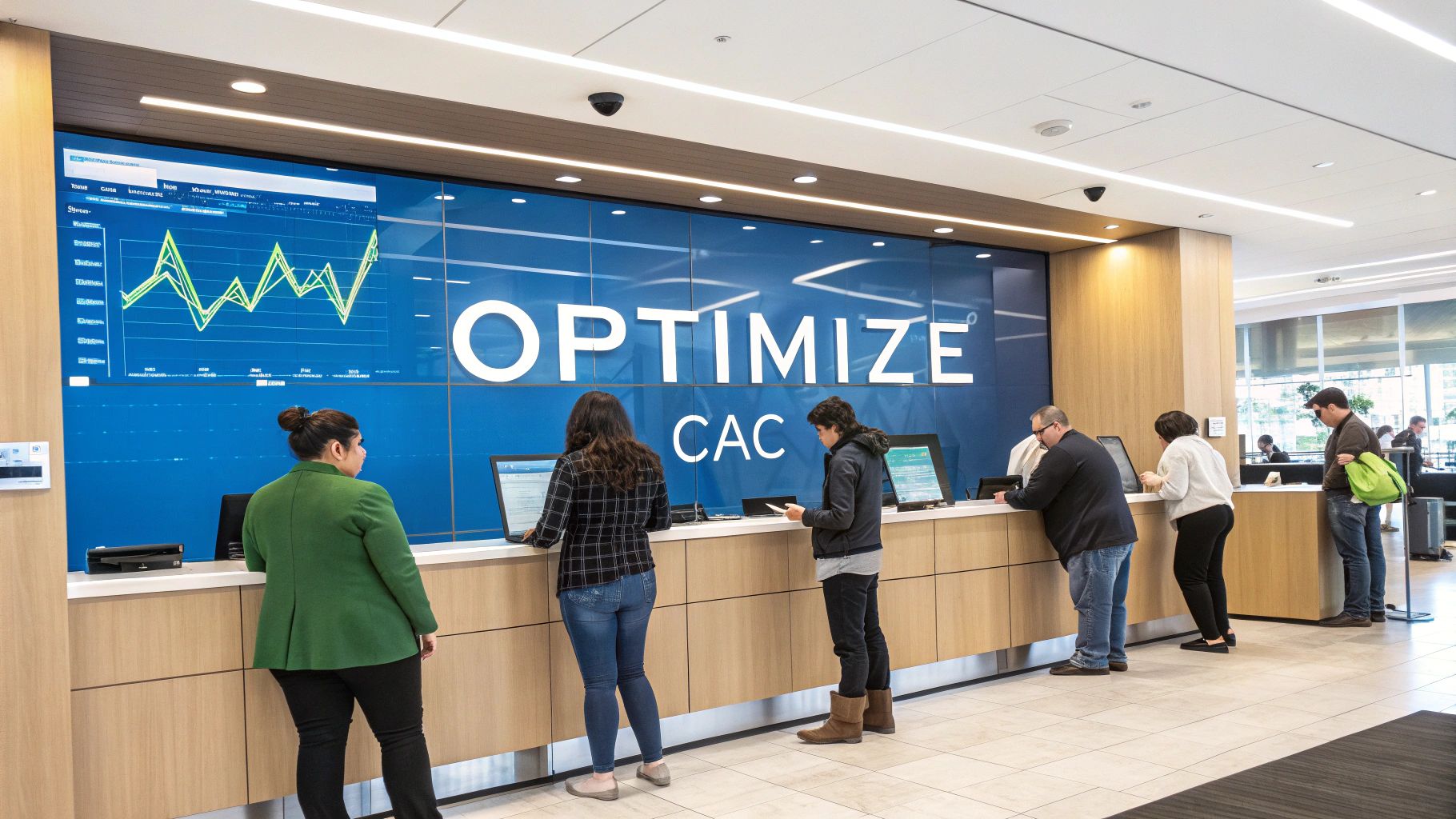← Back to News
Visbanking Talent Lets You Find Candidates Before They Apply
Banking Knowledge Base4/14/2025Banking Knowledge BaseRevolutionizing Banking Talent Acquisition

Revolutionizing Banking Talent Acquisition
- Traditional Job Boards Are Obsolete: Conventional recruitment methods fail to capture top financial talent, requiring more sophisticated sourcing strategies.
- Passive Sourcing is Critical: Proactively identifying and engaging high-quality candidates who aren't actively job searching is essential in competitive banking recruitment.
- AI Transforms Talent Discovery: Machine learning algorithms can analyze professional profiles with unprecedented accuracy, dramatically improving candidate matching.
- Direct Hiring Builds Strategic Talent Pipelines: Continuous engagement and relationship-building with potential candidates create long-term recruitment advantages.
- Modern Metrics Matter: Success is now measured by quality of hire, retention rates, and cultural fit, not just time-to-fill metrics.
- Technology Enables Precision: Advanced platforms like Visbanking provide comprehensive tools to streamline and optimize the entire recruitment process.
Table of Contents
- Why Traditional Job Boards Fall Short for Banking Recruitment
- Transforming Finance Hiring Through Passive Candidate Sourcing
- How AI-Powered Tools Revolutionize Financial Talent Discovery
- Direct Hiring Strategies That Bypass Traditional Recruiting
- Finding Hidden Finance Talent in Today's Market
- Measuring Success with Modern Recruiting Metrics
- Getting Started with Visbanking Talent Platform
Why Traditional Job Boards Fall Short for Banking Recruitment
The traditional approach of posting jobs and waiting for candidates to apply is becoming increasingly ineffective in the competitive banking sector. Financial institutions using passive candidate sourcing tools are discovering that conventional job boards no longer deliver the quality candidates needed for specialized banking roles. With rising posting costs and declining application rates, banks must shift towards more proactive talent acquisition strategies. Job boards often attract active job seekers who may not possess the specific expertise required for complex banking positions. Additionally, the most qualified candidates are typically already employed and not actively monitoring job postings, making them invisible to traditional recruitment methods.Transforming Finance Hiring Through Passive Candidate Sourcing
Passive candidate sourcing represents a strategic shift in banking recruitment, focusing on identifying and engaging qualified professionals who aren't actively seeking new opportunities. This approach enables banks to tap into a vast talent pool of experienced financial professionals who might be open to the right opportunity but aren't browsing job boards. By leveraging sophisticated sourcing tools, recruiters can identify candidates based on specific skills, experience, and cultural fit before they enter the job market. This proactive approach significantly expands the potential candidate pool and increases the likelihood of finding ideal matches for specialized banking roles.How AI-Powered Tools Revolutionize Financial Talent Discovery
Artificial intelligence has transformed the recruitment landscape, particularly in financial services. Modern AI sourcing platforms utilize machine learning algorithms to analyze vast databases of professional profiles, identifying candidates who match specific role requirements with unprecedented accuracy. These tools can predict candidate success based on historical data and pattern recognition. The automation capabilities of AI-powered platforms significantly reduce time-to-hire while improving match quality. By processing thousands of profiles in seconds, these systems can identify qualified candidates who might be overlooked through traditional screening methods. Learn more about our AI-powered solutions designed specifically for banking recruitment.Direct Hiring Strategies That Bypass Traditional Recruiting
Direct hiring approaches enable banks to build relationships with potential candidates before positions become available. This strategy involves creating talent pipelines through targeted outreach, professional networking, and engagement with industry communities. By maintaining ongoing connections with qualified professionals, banks can quickly fill positions when needs arise. Successful direct hiring requires a combination of personal outreach and automated tools to manage relationships at scale. Banks can utilize specialized platforms to track interactions, measure engagement, and maintain consistent communication with potential candidates.Measuring Success with Modern Recruiting Metrics
Modern recruitment success extends beyond basic metrics like time-to-fill positions. Key performance indicators now include quality of hire, long-term retention rates, and cultural fit assessments. Advanced analytics tools provide insights into recruitment effectiveness, candidate engagement levels, and hiring process efficiency. These metrics help organizations refine their recruitment strategies, optimize resource allocation, and demonstrate the ROI of their talent acquisition investments. Regular analysis of these metrics ensures continuous improvement in recruitment processes.Getting Started with Visbanking Talent Platform
Implementing the Visbanking Talent Platform is straightforward and designed to deliver immediate value. Our platform combines AI-powered candidate matching, automated outreach tools, and comprehensive analytics in a single, intuitive interface. Organizations can quickly transition from traditional recruitment methods to a more proactive, efficient hiring approach. Success stories from leading financial institutions demonstrate the platform's ability to reduce hiring costs, improve candidate quality, and accelerate the recruitment process. The platform's features are specifically tailored to address the unique challenges of banking and finance recruitment.Frequently Asked Questions
How does passive candidate sourcing differ from traditional job board recruiting?
Passive candidate sourcing proactively identifies and engages qualified professionals who aren't actively job searching, unlike traditional job boards that wait for candidates to apply. This approach targets experienced professionals already employed, expanding the potential talent pool and increasing the likelihood of finding top-tier banking talent.What advantages do AI-powered recruitment tools offer financial institutions?
AI recruitment tools provide significant benefits including faster candidate matching, more accurate skill identification, predictive hiring success analysis, and the ability to process thousands of professional profiles quickly. These tools reduce time-to-hire, improve candidate quality, and help banks overcome traditional recruitment limitations.Why are traditional job boards becoming less effective for banking recruitment?
Traditional job boards are declining in effectiveness due to rising posting costs, low-quality applicant pools, and inability to reach specialized banking professionals who are typically already employed. Most high-caliber candidates are not actively browsing job boards, making these platforms increasingly inefficient for targeted recruitment.How can banks identify hidden finance talent?
Banks can discover hidden finance talent by utilizing advanced search algorithms, professional network analysis, and specialized talent platforms that identify professionals with precise skill sets. These methods focus on understanding market segments, emerging skills, and targeting professionals who match specific organizational requirements.What modern metrics are important for measuring recruitment success?
Modern recruitment metrics extend beyond traditional measures like time-to-fill, and now include quality of hire, long-term retention rates, cultural fit assessments, candidate engagement levels, and overall recruitment process efficiency. These comprehensive metrics help organizations continuously improve their talent acquisition strategies.Are AI recruitment tools suitable for all bank sizes?
AI recruitment tools are scalable and can be beneficial for banks of all sizes, from regional credit unions to large national institutions. These platforms offer flexible solutions that can be customized to meet specific organizational needs, budget constraints, and recruitment volume requirements.Similar Articles

Brian's Banking Blog
Key Trends in the Banking Industry for Bank Executives

Brian's Banking Blog
The Executive Guide to Personalized Banking Service

Brian's Banking Blog
Strategic Workforce Planning: A Data-Driven Mandate for Bank Executives

Brian's Banking Blog
Mastering Commercial Banking Relationship Management: A Data-Driven Executive Guide

Brian's Banking Blog
What Is Market Intelligence? A Guide for Bank Executives

Brian's Banking Blog
What Is Competitive Intelligence in Banking?

Brian's Banking Blog
How to Reduce Employee Turnover in Your Bank

Brian's Banking Blog
What Is Business Intelligence Analytics for Banking?

Brian's Banking Blog
Mastering Bank Customer Acquisition Cost: A Strategic Guide for Executives

Brian's Banking Blog